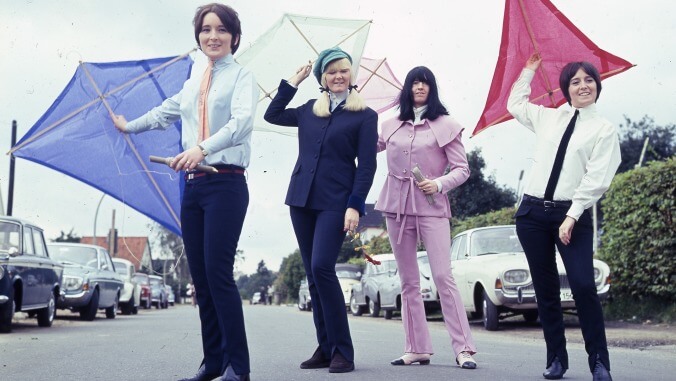The ’Birds and The Beatles: Meet The Liverbirds, the Fab Four’s female contemporaries

We explore some of Wikipedia’s oddities in our 5,993,858-week series, Wiki Wormhole.
This week’s entry: The Liverbirds
What it’s about: A lovable foursome of rock-and-rollers from Liverpool, who tore up the Merseybeat scene before moving to Hamburg and playing at the Star Club, mixing Motown covers with their own catchy originals. Yes, it’s The Liverbirds, the female contemporaries of The Beatles who followed the Fab Four’s same early path, but never found quite the same level of success. Still, guitarists Valerie Gell and Pamela Birch, bassist Mary McGlory, and drummer Sylvia Saunders made a name for themselves in Hamburg, and were stars in Germany through the mid ’60s.
Biggest controversy: While The ’Birds knew The Beatles, there’s no evidence they were friends. John Lennon sneered at them, “Girls don’t play guitars,” although they played well enough to take over The Beatles’ slot at the Star Club when the latter band returned to England to begin their recording career. (The Liverbirds would record as well, but they remained in Germany to do so.) In 2019, Ian Salmon’s musical Girls Don’t Play Guitars, which recounted The Liverbirds’ career, premiered at the Royal Court Theater in Liverpool; two members of the band collaborated on the production and appeared onstage as an encore.
Strangest fact: There’s no such thing as a liver bird. Pronounced like “fiver,” not “river,” the bird is a symbol of Liverpool, appearing on the city’s seal, despite not existing. The seal dates back to the 13th century (the city was founded in 1207 and re-incorporated in 1229), and depicts some sort of bird. Historians surmise it was either meant to be an eagle, or a dove with an olive branch, but “shoddy draughtsmanship” means the bird isn’t recognizable as either, and was often seen as a cormorant, which are native to the area. Eventually, Liverpudlians began calling the mystery fowl the Liver Bird, after their city, and the name stuck. In fact, when Sir Paul McCartney was knighted, he was given a crest with a liver bird holding a guitar.
Thing we were happiest to learn: The Liverbirds proved Lennon wrong. They were one of the Star Club’s biggest attractions, (although they were often promoted as “the female Beatles,”) and all of their recordings were released on the club’s private label. They performed on German TV (as mentioned last week), and before breaking up in 1968, did a tour of Japan.
Thing we were unhappiest to learn: One area where The Liverbirds didn’t follow The Beatles’ example was songwriting. While they did write some originals, their four singles were all covers—Smokey Robinson’s “Shop Around” in 1964, Bo Diddley’s “Diddley Daddy” and the Marathons’ “Peanut Butter” in ’65, and Johnny Thunder’s “Loop De Loop” in ’66—with some ’Birds-penned songs on the B side. Based on the title, we assume their 1965 record, Star-Club Show 4, was a live album. It’s not clear what was on the following year’s More Of The Liverbirds, but it was the end of The ’Birds’ brief recording career.
Also noteworthy: Germany loved The Liverbirds and the feeling was mutual. Three of the four members remained in Hamburg permanently after the band split (although Gell lived in Munich for a few years and returned). McGlory even stayed in the music business, forming a music publishing company with her late husband (songwriter Frank Dostal), which she still runs today. Only Saunders left the country, settling down in Spain, although the band reunited in 1998, and Saunders returned to Liverpool for the Girls Don’t Play Guitars musical.
Best link to elsewhere on Wikipedia: This week the best links aren’t on Wikipedia, but YouTube, where several Liverbirds live performances have been preserved, along with studio recordings, clips from the musical, and a brief New York Times-produced documentary about the band. (Also an episode of the unrelated 1970s BBC sitcom The Liver Birds)
Further Down the Wormhole: The Liverbirds were one of the first all-female rock bands, still sadly a rarity as women in music continue to be underrepresented. Women have similarly lacked equal opportunities in the field of piracy, although one 14th-century French noblewoman decided to buck that trend. We’ll hear the scurvy tale of Jeanne de Clisson next week.